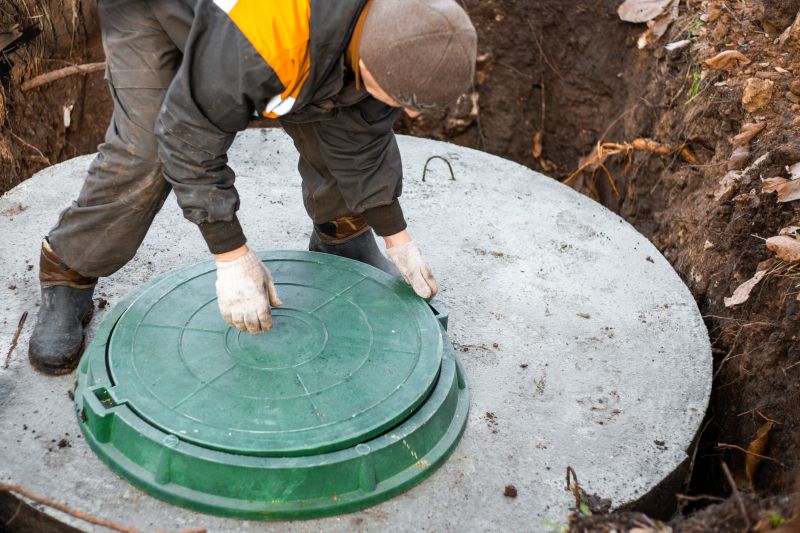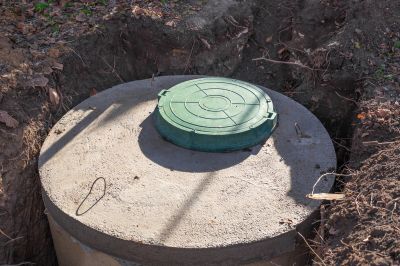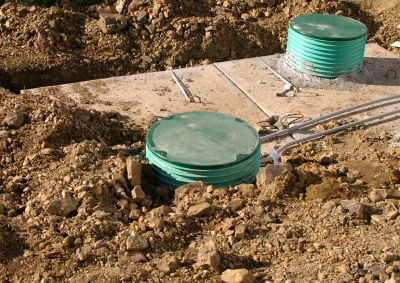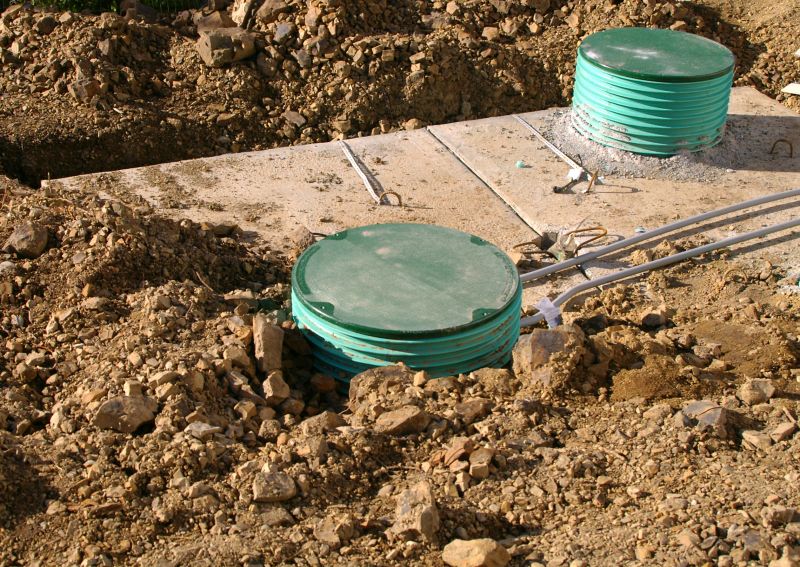Get Septic Tank Replacement in Denver, CO
Septic tank replacement services for Denver-area property owners involve removing old tanks and installing new ones to prevent backups, leaks, and system failures.
Property owners in Denver, CO, who are considering septic tank replacement understand the importance of choosing reliable, experienced service providers. Whether planning a major renovation or updating aging infrastructure, exploring local contractors ensures that the work aligns with regional regulations and environmental conditions. Comparing options within the area can help identify professionals who are familiar with the specific needs of properties in Denver and nearby communities, providing peace of mind for a smooth and efficient process.
If a property’s septic system is showing signs of wear or has reached the end of its lifespan, connecting with qualified local contractors is a practical step toward addressing the issue. These service providers can offer insights into the best solutions for your property, helping you plan a project that meets your needs and adheres to local standards. Keep reading to discover how experienced professionals in the Denver area can assist with septic tank replacement and ensure your property remains functional and compliant.
- Septic Tank Replacement - needed when a septic system shows signs of failure or persistent backups in neighborhoods like Highlands Ranch.
- Septic Tank Replacement - required if the existing tank is damaged or has reached the end of its lifespan in areas around Aurora.
- Septic Tank Replacement - necessary when upgrading an outdated system to meet current code standards in Denver’s residential districts.
- Septic Tank Replacement - essential after a system has been compromised by flooding or heavy groundwater in nearby communities.
- Septic Tank Replacement - sought when experiencing frequent odors or slow drains that indicate a failing septic setup in the Denver metro area.



Septic tank replacement services involve removing an aging or failing septic system and installing a new one that meets the property’s needs. This process typically includes excavating the existing tank, disconnecting and removing the old unit, and installing a new tank made from durable materials such as concrete, fiberglass, or polyethylene. The work also involves properly connecting the new tank to the property’s drain field and ensuring all components are correctly installed for optimal function. This service is essential for maintaining a reliable wastewater management system, especially when the existing septic tank has become too old, damaged, or inefficient.
Replacing a septic tank helps resolve a variety of common problems. Homeowners may notice persistent foul odors, slow drains, or backups in toilets and sinks, which often indicate a septic system failure. Additionally, frequent drain field issues, such as pooling water or lush, overly green patches in the yard, can signal that the existing tank is no longer functioning properly. Over time, septic tanks can corrode, crack, or become overwhelmed by increased household usage, leading to potential health hazards and property damage. A professional replacement ensures these issues are addressed, restoring proper wastewater flow and preventing costly repairs down the line.
Septic tank replacement services are typically needed on properties that rely on on-site wastewater treatment systems. This includes rural homes, properties with large acreage, or places where municipal sewer connections are not available. Residential properties with aging septic systems that have reached or exceeded their lifespan are common candidates for replacement. Additionally, properties experiencing frequent plumbing problems, signs of system failure, or new construction projects that require updated wastewater management solutions may also benefit from professional septic tank installation. These services help ensure the property remains compliant with local health and safety standards.
For homeowners considering septic tank replacement, understanding when to seek professional help is important. Signs that a replacement may be necessary include persistent odors, slow draining fixtures, sewage backups, or visible damage to the septic tank or drain field. If the existing system is over 20-30 years old or has experienced repeated failures, consulting with local contractors can provide guidance on whether a replacement is the best solution. Proper installation by experienced service providers helps ensure the new septic system functions efficiently, reduces the risk of future problems, and supports the ongoing health and safety of the property.
The overview below groups typical Septic Tank Replacement projects into broad ranges so you can see how smaller, mid-sized, and larger jobs often compare in Denver, CO.
In many markets, a large share of routine jobs stays in the lower and middle ranges, while only a smaller percentage of projects moves into the highest bands when the work is more complex or site conditions are harder than average.
Smaller Repairs - minor repairs or routine maintenance typically cost between $250 and $600 for many jobs in Denver and surrounding areas. Many routine repairs fall within this middle range, covering tasks like sealing leaks or replacing parts.
Partial Replacement - replacing a section of the septic tank or making significant repairs usually ranges from $1,200 to $3,500. Larger projects like tank upgrades or repairs to the entire system are less common but can reach higher costs.
Full Septic Tank Replacement - a complete replacement of a septic tank generally costs between $3,500 and $7,000, depending on tank size and site conditions. Many projects in this category fall into the middle of this range, with fewer reaching the highest tiers.
Complex or Large-Scale Projects - extensive replacements or custom installations can exceed $10,000, especially for challenging sites or specialized systems. These higher-end projects are less frequent but represent the upper end of typical costs for septic tank services in the region.
Actual totals will depend on details like access to the work area, the scope of the project, and the materials selected, so use these as general starting points rather than exact figures.
Drain Field Replacement - this project involves excavating and installing new drain fields, requiring similar planning and site preparation skills as septic tank replacement.
Septic System Installation - installing a complete septic system involves site assessment, excavation, and system setup, aligning with the skills used in tank replacement.
Septic Tank Pumping and Maintenance - regular pumping and maintenance services require knowledge of septic systems and proper handling of waste, related to septic tank replacement tasks.
Leach Field Repair - repairing or replacing leach fields involves excavation and soil assessment, comparable to the planning involved in tank replacement projects.
Underground Utility Locating - accurately locating underground utilities is essential before septic work, sharing planning and excavation skills with tank replacement services.
Soil Testing and Site Assessment - evaluating soil conditions for septic system suitability involves similar site planning and analysis skills as septic tank replacement.

When comparing septic tank replacement service providers in the Denver area, it’s important to consider their experience with similar projects. Homeowners should look for local contractors who have a proven track record of handling septic system replacements in environments comparable to their own. Asking about the number of completed projects and the types of properties served can provide insight into a service provider’s familiarity with local soil conditions, regulations, and common challenges. An experienced contractor is more likely to understand the nuances of septic system installation and can help ensure the project is completed efficiently and effectively.
Clear written expectations are essential when evaluating potential service providers. Homeowners should seek out contractors who can provide detailed descriptions of the scope of work, including materials used, installation procedures, and any necessary permits or inspections. Having a well-defined plan helps prevent misunderstandings and ensures that all parties are aligned on the project’s goals. It’s also beneficial to request written estimates or proposals that outline costs and deliverables, enabling a straightforward comparison between different local providers.
Reputable references and strong communication are key indicators of a reliable septic tank replacement contractor. Homeowners should ask for references from previous clients who had similar work done, allowing them to gather firsthand feedback on the contractor’s professionalism, quality of work, and adherence to timelines. Good communication throughout the process-such as prompt responses to questions and transparency about the project-can make the experience smoother and more predictable. While the site introduces homeowners to local service providers capable of performing the work, it’s important to assess each contractor’s reputation and communication style to find the best match for the project.
Property owners in Denver, CO use Septic Tank Replacement services for practical projects around their homes and businesses. This guide focuses on everyday jobs and straightforward project options.


Septic tank replacement services are often needed when property owners in Denver notice persistent odors, slow drainage, or backups in their plumbing systems. These issues can indicate that the existing septic tank has reached the end of its lifespan or is no longer functioning efficiently. Additionally, property owners planning significant renovations or new constructions may require a new septic system to meet current standards and ensure proper waste management. Local contractors experienced in septic systems can assess the situation and determine if a replacement is necessary to maintain the property's sanitation and functionality.
In some cases, property owners might seek septic tank replacement due to age or damage caused by harsh Colorado weather conditions, such as freeze-thaw cycles that can crack or weaken tanks over time. Others may find that their current system no longer complies with local regulations or is unable to support increased household or business capacity. When these situations arise, trusted service providers in Denver can handle the installation of a new septic tank, helping property owners ensure their waste management system is reliable and up to code.
When should a septic tank be replaced instead of repaired? Septic tanks typically need replacement when they are extensively damaged, have reached the end of their lifespan, or cannot be effectively repaired to function properly.
What signs indicate a septic tank may need replacement? Signs include persistent backups, foul odors around the system, standing water or soggy areas near the drain field, and frequent system failures despite repairs.
How do local contractors handle septic tank replacements? Local service providers assess the condition of the existing system, obtain necessary permits, and perform removal and installation of a new septic tank according to local regulations.
Are there different types of septic tanks available for replacement? Yes, contractors can install various types of septic tanks, such as concrete, plastic, or fiberglass, based on site conditions and system requirements.
What factors should be considered when choosing a septic tank replacement? Factors include tank size, material, system design, local code requirements, and the specific needs of the property’s wastewater management.
Septic Tank Replacement Planning - Property owners can explore options for replacing aging or failing septic tanks to ensure reliable waste management.
System Upgrade Ideas - Homeowners looking to upgrade their septic systems for better efficiency or capacity can find local contractors to assist with planning.
New Construction Projects - Builders and developers can consider septic tank replacement services when designing new properties to meet current standards.
Environmental Compliance - Property managers may use septic replacement services to ensure their systems comply with local regulations and avoid future issues.

If you are thinking about Septic Tank Replacement for a property in Denver, CO, this guide is meant to help you understand the work, the typical project types, and how different options might fit your plans.
When you are ready, you can use the quote form on this page to share a few details about your project. From there, local pros can review the basics and respond with options that match what you have in mind.
